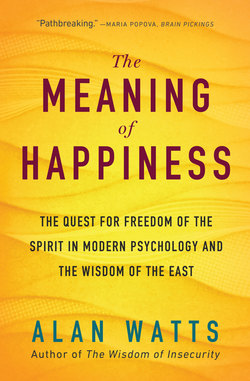Читать книгу The Meaning of Happiness - Alan Watts - Страница 8
На сайте Литреса книга снята с продажи.
ОглавлениеPREFACE TO LAYMEN AND SPECIALISTS
Books on happiness are generally speaking of two kinds. There are those which tell us how to become happy by changing our circumstances, and those which tell us how to become happy by changing ourselves. And then, if such books are not mere philosophy, both kinds proceed to give practical advice as to the ways and means in which happiness may be attained, describing a spiritual, psychological, or material technique to achieve the desired result.
This book falls into neither of these two categories, its author believing that happiness of the profoundest kind is beyond the reach of any technique under the sun. Although he claims that this book is strictly practical, it does not name a single thing which one can do in order to become happy. Naturally it will be asked, “If there is nothing that one can do either to oneself or to one’s circumstances in order to become happy, is any purpose to be served in writing a book to state such a dismal conclusion?” But the conclusion is not dismal. To put it bluntly, it is possible in a certain sense to become happy without doing anything about it. We do not go quite so far as to say that, without knowing it, man is already more happy than he has ever dreamed. Obviously, this is not true, although it is very nearly true. For the object of this book is to prove to men and women something about themselves as they are now, which, if understood, at once creates the greatest happiness that man can know. By this is not meant a state of mere emotional and mental comfort or gaiety, but rather an inward experience of the spirit which persists through the deepest suffering.
As this book is written primarily for laymen, the author hopes he will be forgiven for calling rather frequently on two departments of knowledge which are usually the special preserve of the learned, namely the philosophy of ancient Asia and certain aspects of modern psychology. He has therefore had to employ a number of special terms because the English language is not always equipped to express certain ideas in plain, straightforward words without lamentable confusion and misunderstanding. He trusts, therefore, that such terms are sufficiently explained, but asks it to be borne in mind that every human being speaks a different language and that sometimes it seems as if words were made to conceal thoughts. Now it is often that the specialist, the professional philosopher or psychologist, delights in the precise use of words, and sometimes he will find this book extremely irritating because it uses words whose meaning is quite clear to the “man in the street” but utterly obscure to the philosopher. For example we may take such words as “life,” “nature,” “love,” “fate,” or “soul.” These words have been used freely because they are living words, which, if read without hypercritical sophistry, can mean more than any number of special terms. Thus it will be seen that the author has tried to steer a middle course between the two obscurities of oversimplicity and overtechnicality.
Some Orientalists and psychologists may complain that their researches have been grossly misused and misinterpreted in some of the conclusions which have been drawn from them. Various aspects of Christian theology may seem to have suffered in the same way, but, for those who wish to inquire more closely into original sources, notes giving “chapter and verse” have been provided at the end of the book. One thing more must be said for both laymen and specialists, and particularly for reviewers. Each chapter in this book is an introduction to the last, upon the subject of which the whole validity of the central theme depends and apart from which it should not be judged.
In conclusion the author wishes to thank Dr. Charles G. Taylor of New York for his advice on preparing an important section of the manuscript, and also the Rev. Sokei-an Sasaki for allowing the author to consult his translation of an otherwise unavailable text.
Alan W. Watts
New York City
January 1940
